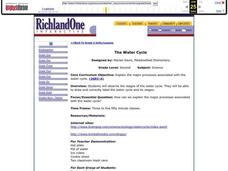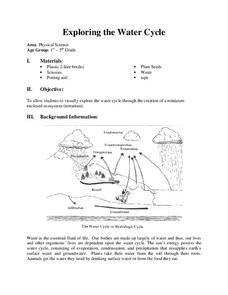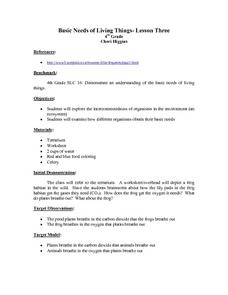Curated OER
Water, Water Everywhere
Studetns view a terrarium with water droplets on the wals. They discuss the ways the water could have got onto the wall of the terrarium. Students design an experiment to duplicate the process. They describe the patterns form their data...
Curated OER
The Water Cycle
Fifth graders review and discuss, "The Water Cycle" and its key elements of evaporation, condensation and precipitation. They create a terrarium in groups to connect concepts of The Water Cycle and to view precipitation, condensation,...
Curated OER
Time-Lapsed Observations
Students explore timed observations for science investigations. They record ideas on a chart related to a classroom closed terrarium. They repeat their observations for several days and time observations for changing shadows during the...
National Park Service
Living & Non-Living Interactions
What better way to learn about ecosystems than by getting outside and observing them first hand? Accompanying a field trip to a local park or outdoor space, this series of collaborative activities engages children in learning about the...
University of Connecticut
Building Your Own Biosphere
On September 26, 1991, four women and four men entered the scientific experiment, Biosphere 2; the doors were sealed for two years in order to study the interactions of a biosphere. In the activity, scholars explore biospheres by...
Science Matters
Crawly Composters
Get your hands dirty with an interactive instructional activity that showcases the process of decomposing and returning nutrients back into the soil. After building a compost pile, pupils regularly observe the...
Curated OER
The Great Kapok Tree..
Students predict what each animal in the story read says and then compare them. They pretend that a tree was cut down and write a new ending for the story. Students explain why the story is not true and create a Venn Diagram comparing...
Curated OER
Wonderful Worms
Students identify living and non-living things and explain the importance of earthworms to the soil. They name some basic facts about earthworms, recognize basic worm vocabulary words and demonstrate vermicomposting techniques.
Curated OER
PLANT LIFE CYCLES
Student learns about the life cycle of plants by watching a time-lapse video. This activity provides students with further evidence that all living things grow and change as they progress through their life cycle. Student conducts a...
Curated OER
Butterflies on Camera
Students explore the real experience with the sequence and process of caterpillar-to-butterfly metamorphosis. They actually get to watch the process unfold in the classroom. A Flex-Cam records the video of the process to assure that the...
Curated OER
The Water Cycle
Second graders conduct an a water cycle experiment. In this water cycle lesson plan, 2nd graders observe a puddle of water, they predict how it got there and what will happen to it. Students watch a demonstration on the water cycle and...
Curated OER
Worms! Nature's Recyclers
Third graders explore the process of composting. In this composting lesson, 3rd graders read the book Wonderful Worms, and create composters.
Curated OER
Student Designed Investigations: Observations
Students choose an organism and create an experiment with that organism. In this observation lesson, students expose a living thing to something from its environment and record their observations. Students must have some prior knowledge...
Curated OER
Understanding Air Pressure
Fifth graders complete experiments with air to understand that air takes up space, has mass, and that air pressure can be changed. In this air pressure lesson, 5th graders test the air pressure by using balloons, syringes, and water to...
Curated OER
Death On Board La Belle: Finding Clues from Old Bones
Students practice analyzing skeletal remains for clues by using the Internet. In this scientific investigation lesson, students research the La Belle shipwreck using the Internet and written materials, later completing a Skeletal Report...
Curated OER
Food Webs and Making Miniature Ecosystems
Students model a food web and create a miniature ecosystem. In this animal interactions lesson, students engage in a role playing game which simulates a food web. Students then build miniature ecosystems using pop bottles, snails, plants...
Curated OER
A Symphony of Decomposers
Young scholars discover decomposition. In this environmental lesson, students explore different types of decomposers and their role within the ecosystem. Young scholars also discover how waste interferes with the decomposition process.
Curated OER
Exploring the Water Cycle
Students investigate the water cycle. In this water cycle instructional activity, students create an ecosystem within a 2-liter bottle. Students record scientific observations as they observe the water cycle within their ecosystem.
Curated OER
Venus Flytrap
Students study the Venus Flytrap including its habitat and how it eats. In this ecology lesson students complete several experiments using a Venus Flytrap to see how it reacts to various conditions.
Curated OER
WET Science Lesson #3: Comparison of Aquatic and Terrestrial Plants
Elementary life science explorers compare and contrast aquatic and terrestrial plants (elodea and soybeans) in a Venn diagram. Some background information is provided to support direct instruction, and general instructions are provided...
Curated OER
Ecosystem Energizers
Fourth graders see how the flow of energy through an ecosystem made up of producers, consumers, and decomposers carries out the processes of life and that some energy dissipates as heat and is not recycled.
Curated OER
Territorial Behavior in Crickets
Students explore the behavior of crickets during courtship. They measure the number and types of interactions between household crickets. Students discriminate between quantitative and qualitative observations. They collect data to...
Curated OER
Basic Needs of Living Things-Lesson Three
Fourth graders explore the interconnectedness of organisms in the environment and examine how different organisms obtain their basic needs. They discuss a frog's habitat and what is found in it. Students discuss the processes of...
Curated OER
Mini-Ecosystems
Third graders identify the living and non living things in a book read aloud and discuss the interactions represented in the book. Then, they research and include a list of food that each animal needs in an ecosystem. Finally, 3rd...
Other popular searches
- Science Project Terrarium
- Ecosystem Bottle Terrarium
- Carbon Cycle Terrarium
- Making a Terrarium
- Soda Bottle Terrarium
- Building a Terrarium
- Terrarium Science Experiment
- Rainforest Terrarium
- Terrarium and the Water Cycle
- Rain Forest Terrarium
- Water Cycle Terrariums
- Mini Terrariums

























